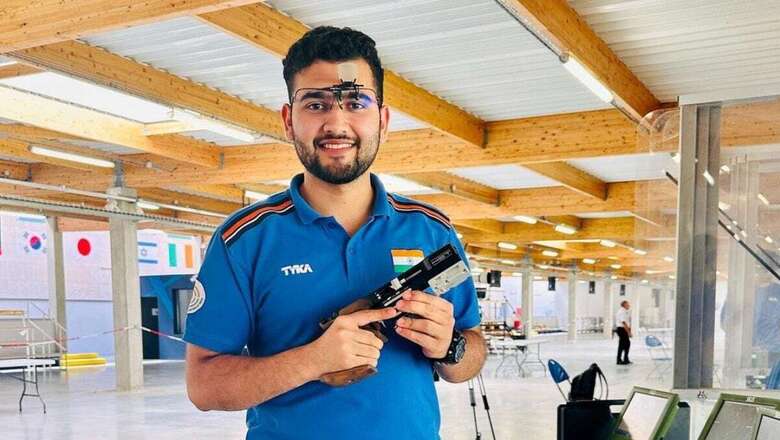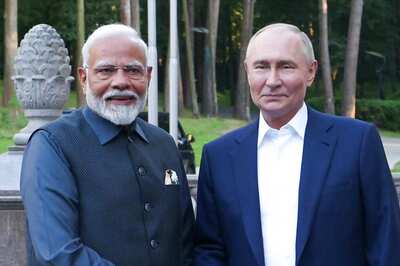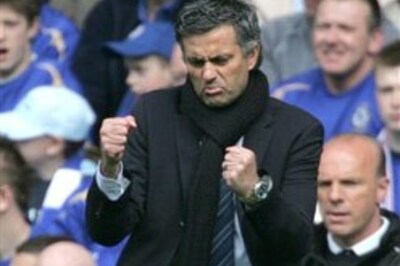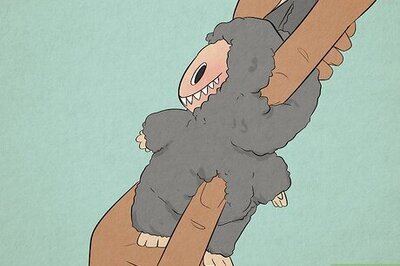
views
Take stance, grip the rifle, aim, place the finger, control breathe, control movement, squeeze the trigger, follow-through. This is probably the simplest manner to explain the steps of shooting. But shooting itself, is not so simple.
India accomplished their ‘Abki baar, sau paar’ mission at the Hangzhou Asian Games at the start of October, and shooting was one of the primary contributors.
ICC World Cup: Schedule | Results | Points Table | Most Runs | Most Wickets
With seven gold, nine silver, and six bronze, India shooting contingent returned with a historic haul of 22 medals from the continental event. There has been a steady rise in India’s dominance in shooting over the years.
21-year-old Anish Bhanwala won Bronze in Men’s 25m rapid fire pistol team event alongside Vijayveer Sidhu and Adarsh Singh at the Hangzhou Asian Games and News18 caught up with him to try and decode India’s growth in the sport over the years.
Anish had travelled to Germany in June 2022 for training with German shooters, participating in domestic competitions there and understand what makes them better.
Anish confidently narrated India’s rise in shooting over the years and also claimed that Indian shooters have better government support than many European countries.
“We had a foreign coach till 2021 and I worked with him since 2017. So it was time to get more exposure after the Tokyo Olympics. In June 2022, I started training in Germany.
“Right now India has very good facilities. There is no comparison as such, both the countries have sufficient facilities for a shooter to train. We are not less in anything. But the support provided from the ecosystem in India is even better than Germany and many other European countries.
“The government is very supportive – free and open training centres, no limits on use of ammunition are some of the factors that help shooters in the country. I would say, it’s an ecosystem which has been built slowly. Maybe the support started after 2008,” Anish said.
Abhinav Bindra won the first ever individual Olympics gold medal for India in 2008. The likes of Rajyavardhan Rathore (Athens, 2004) and Gagan Narang (London, 2012) had also shone with Olympic medals during that phase.
The baton then passed to Jitu Rai and Heena Sidhu’s batch who again brought multiple laurels to the country. That batch inspired the youngsters in Anish, Manu Bhaker, and several others.
“Watching us win medals at age of 15-16, parents would have thought we should put our kids into training. Shooting range are now opening in many schools. All cities in North India at least have a 10m shooting range. It is more accessible, and more affordable. We have more number of shooters and we have such a mass, talent will come out more easily,” Anish explains.
“In 2016-17, there was no much support from the government side. I would get support in national camps, maybe 10 days before a competition. The family used to invest a lot in trainings. Now, the government has provided Khelo India shooters with 365 days of free hostel, coach, ammunition, shooting range, which is a lot of expense for each month. And the elite athletes get international exposure for training like I was in Germany,” Anish added.
Exposure to shooting
Anish, as a school kid, was into multiple sports and was introduced to shooting through Modern Pentathlon.
“I was always interested in sports. I used to skate, play cricket in school. When I was in 4th, I started swimming, and in 5th class, I came to know about modern Pentathlon. There was a coach in our district and I used to train for all the five sports. That is how I was introduced to shooting,” Anish narrated the timeline.
But shooting turned out to be his favourite of the five sports.
“It was difficult to train for all five of them, so I chose shooting. I had better results in shooting and it was more interesting for me. My neighbour Harpreet Singh, who is also my current coach, had won Commonwealth Games medal twice. So of course I was inspired by him and I thought, ‘yeah, shooting will be a good thing.’ This was in sixth class,” Anish continues.
He had a strong support from his family as well as his university.
Interestingly, her sister as well was into shooting and the duo became the first sibling-pair to win gold medals at any ISSF series in 2018 as both won gold at ISSF Junior World Cup.
“Me and my sister started together, kept pushing each other, competed amongst ourselves and we grew well enough. The results started coming in so parents as well-supported.”
Anish has a disciplined training routine and trains for at least eight hours daily.
The shooter explained mental training of visualization technique. “I train for six hours for shooting. I do one hour of gym, and I meditate or do yoga in the morning. At night, there is also mental training – visualization of a competition – imagining a competition, the venue, spectators, firing point. I am still getting experienced on how to do it. Before any competition, for 15-20 days it is specific to the competition, but generally four to five times a week,” he said.
While Anish trained at Sports Authority of India’s (SAI) Dr. Karni Singh shooting range, he also appreciated the support he received from Manav Rachna University.
“I was training at SAI’s Dr. Karni Singh shooting range in 2015. It’s on the border of Delhi and Haryana. At that time, there was a 25m shooting range at Manav Rachna Academy, which was very rare. No other private academy had a shooting range in Haryana. Whenever the Karni Singh range was closed, it was a good alternate option for me. I used to go there to train till 2017.”
Once Anish joined the university as a student, he was supported quite more.
“And then in 2018, I got admission at Manav Rachna in Humanities. I also got support for academics from the school. There was more personal help once I was part of them. The shooting range was always open for me.”
At such a young age, Anish has already won medals at World Championships, Commonwealth Games and the Asian Games.
Anish’s coach Harpreet Singh explains what makes him a special and unique shooter compared to others.
“Quite a few students train under me, but what makes Anish different from others is that his grasping power and memory is very sharp. Anything I tell Anish, he implements it immediately, while others take a month to work on it. He is hard working as well. He is determined to excel not only in India but at World level.
“Also, he believes me without any doubts, so he does whatever I recommend. Even if I ask him to change anything, he does without any fear of failing after changing anything,” Harpreet said.
Having already travelled so far in his professional shooting journey, Anish now aims to qualify for the 2024 Paris Olympics.
“I mainly set performance goals. My plans are on how to improve my technique and my scores. In terms of achievements, I am looking forward to qualify for Paris Olympics in next two competitions (Asian Championships and Asian Olympic qualification competition) for sure,” he said.



















Comments
0 comment